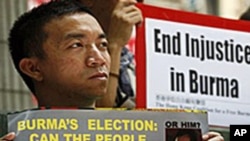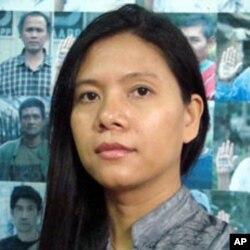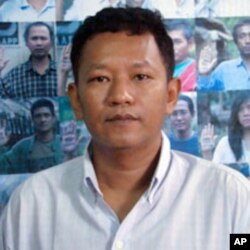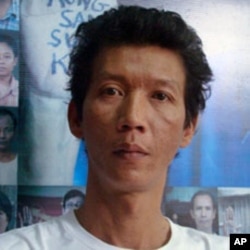In northwestern Thailand, former political prisoners from Burma fear that their country's coming elections could lead to a new crackdown on dissent.
As a rainstorm sweeps across the border town of Mae Sot, Khin Cho Myint, a former political prisoner in Burma, tells of the struggles that critics of her country's military government face. She sits in the office and museum of the Assistance Association for Political Prisoners Burma.
Portraits of political prisoners who died while incarcerated stare down from the white-washed walls. Elsewhere, pictures depict the torture used in the prisons - with prisoners tethered or standing in difficult positions, threatened with violence.
"We display the picture of the political prisoner who died in Burmese prisons. On the map we show the 44 prisons in Burma, in different division and state there are 44 prisons in Burma. We display life in prison," Khin Cho Myint said. "How the authorities provide for political prisoner for daily food, their rice and pea soup and rice and vegetable soup for dinner. It is not nutritious."
Khin Cho Myint was arrested in 1998 and sentenced to 10 years jail for involvement in the student democracy movement. She was released in 2004 after serving five years and nine months. She fled Burma fearing re-arrest.
After her arrest Khin Cho Myint was interrogated, denied food and sleep and then sent to solitary confinement. "Sometime I have no one to smile [to], no one to talk [to]. So this is one thing. Everything like using pure water for drinking; sometime they provide not pure water. For example the water is from the river," she says, "So how can I drink as drinking water?"
Former political prisoners set up the Assistance Association in 2000. The group says there are 2,193 political prisoners in Burma.
Bo Kyi, the association joint secretary, says conditions for prisoners appear to be getting worse. "Interrogators put a rod into the anus of the detainee. It happened in 2010. It means like the torture is systematic. I met with many former political prisoners and finally in 2010 I have evidence of the electric torture, or put iron on the shin, so those are very common - sexual harassment, sexual abuse. We should not tolerate such kind of torture," Bo Kyi said.
One of the museum's walls is dedicated to Burma's most famous political prisoner, Aung San Suu Kyi, who has spent much of the past 20 years in detention. The Nobel Peace laureate remains under house arrest, although the government indicates she will be released when her current detention order expires on November 13.
But for other prisoners, such as 1988 student leader Min Ko Naing, there seems little chance of freedom anytime soon.
He served a 15-year sentence for political activities and was released in 2007. But Min Ko Naing was re-arrested in 2008, and sentenced to 65 years.
Bo Kyi fears more activists will be detained after Burma's November 7 election - a vote many international rights groups and governments consider a sham because of restrictions on opposition candidates.
"We should expect more, more arrest[s] because of the 2008 constitution. There is no freedom of assembly; there is no freedom of expression. So it means all the freedoms, human rights [are] restricted. It means we cannot expect civil society to develop under the new constitution. What our great concern is the constitution, not the election, because the election is based on the new constitution," Bo Kyi said.
Aung Myo Thein, a leader of the 1988 student uprising, served six and half years in the brutal Insein prison before being released in 1995. He fled to Thailand after taking part in protests led by Buddhist monks in 2007 calling for economic and political reforms.
He expects Aung San Suu Kyi to be quickly re-arrested if she is released later this month. During a brief spell of freedom in 2002 Aung San Suu Kyi drew large crowds, which the military did not like.
"When she is released she definitely will contact with her party," Aung Myo Thein states. "When she meets her colleague, the elected new government will announce she contacted with [an] illegal organization and she may be arrested again. This is our opinion."
Bo Kyi says he worries because Burma has no effective legal system. "Soldiers, policemen, armed forces they have the license to kill any citizen of Burma. Without the rule of law we cannot expect peace and stability because like the individual Burmese people do not have safety." he says, "Anyone can be arrested at anytime without any reason."
Burma's government says the elections, the first in 20 years, are part of its move toward civilian government. But military leaders also have said in the past that they must retain a significant role in the government to unify the country's many ethnic groups, some of which have engaged in separatist insurgencies for decades.
The international community, including the United Nations, has called for Burma to allow free, fair and inclusive elections, and to release all political prisoners.
But the military, which has ruled since 1962, appears to have ignored those calls. The constitution guarantees it a quarter of the seats in parliament. Burmese exiles and political analysts expect military-backed parties to win most of the other seats, which means, they say, that little will change for Burma's political prisoners.







